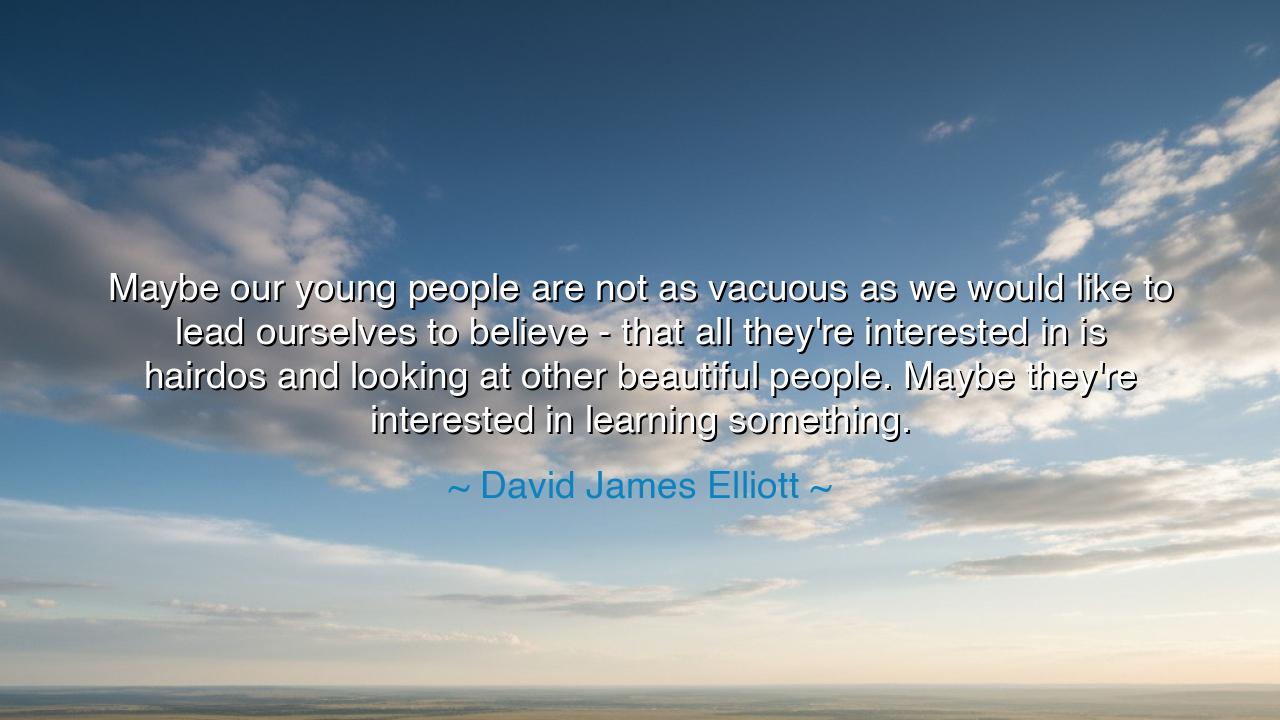
Maybe our young people are not as vacuous as we would like to
Maybe our young people are not as vacuous as we would like to lead ourselves to believe - that all they're interested in is hairdos and looking at other beautiful people. Maybe they're interested in learning something.






In the voice of humility and awakening, David James Elliott once observed: “Maybe our young people are not as vacuous as we would like to lead ourselves to believe—that all they’re interested in is hairdos and looking at other beautiful people. Maybe they’re interested in learning something.” These words, though spoken in the cadence of simplicity, contain the timeless power of revelation. They remind us that the youth, so often dismissed as frivolous or self-absorbed, carry within them the same hunger for meaning and wisdom that has stirred every generation since the dawn of civilization.
Elliott’s reflection springs from his experience as both an artist and an observer of culture. In a world obsessed with appearances and entertainment, he saw how society’s elders often mistake youthful expression for emptiness. His words are both a defense and a challenge—a defense of the younger generation’s potential, and a challenge to the older one’s cynicism. He invites us to look beyond the surface and to recognize that behind every restless young spirit is a mind waiting to be ignited, a heart eager to learn and to grow.
The ancients, too, struggled with this same blindness. In Athens, the philosopher Socrates was condemned by his elders for “corrupting the youth,” though all he sought was to awaken their questioning minds. The old men of his time feared that the young no longer respected tradition, that they cared only for style and pleasure. Yet it was precisely those young students—Plato, Xenophon, Aristotle—who carried his teachings forward and shaped the very foundations of philosophy. History repeats itself: every age doubts its youth, forgetting that they are the bridge between the past’s wisdom and the future’s possibility.
Elliott’s tone carries a quiet irony. When he says “as we would like to lead ourselves to believe,” he exposes a deeper truth—that adults often cling to the illusion of youth’s vanity to shield themselves from their own failures. To dismiss the young as shallow is easier than confronting the ways in which the world has failed to inspire them. Yet, when given vision, responsibility, and purpose, the young rise with astonishing strength. The fault, therefore, is not in their supposed vacuousness, but in the lack of faith they are shown.
Consider the countless moments in history when youth rose to meet the call of destiny. It was the young Alexander the Great who carried Greek culture across the known world; the young Joan of Arc who led France from despair to victory; the young Malala Yousafzai who defied fear to fight for education. Each began as a person underestimated, dismissed by their elders as naïve or unready. Yet their curiosity and courage proved that the power to transform the world often beats strongest in the hearts of the young.
In Elliott’s insight lies an invitation to humility. He reminds us that learning is not confined to classrooms or generations. The spark of knowledge is democratic—it leaps from the teacher to the student, from one age to another, and burns brighter when it is met with trust rather than condescension. The true mentor, like the philosophers and sages of old, sees in every student not emptiness, but potential; not vanity, but unformed brilliance.
The lesson, then, is one of faith and attentiveness. Do not measure the young by their distractions, but by their capacity for awakening. Offer them truth, and they will rise toward it. Engage them with ideas, and they will surpass you. For in every age, the young have always been both mirror and promise—the reflection of what we have taught, and the hope of what we have yet to learn.
Thus, David James Elliott’s words remind us that the young are not empty vessels, but seeds awaiting nurture. It is our task not to scorn them, but to cultivate their hunger for truth, beauty, and purpose. Let us believe, as the ancients did, that to teach and to trust the young is the surest path to keeping the flame of wisdom alive through the ages.






AAdministratorAdministrator
Welcome, honored guests. Please leave a comment, we will respond soon